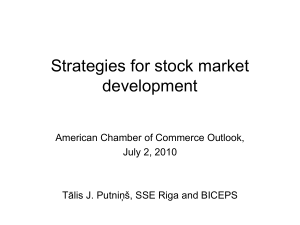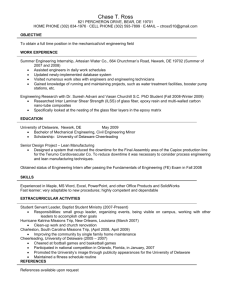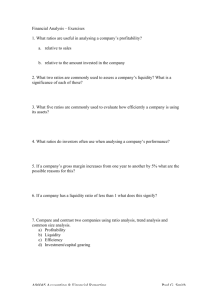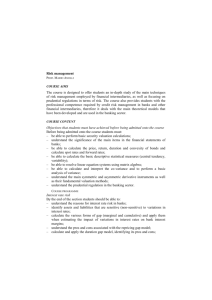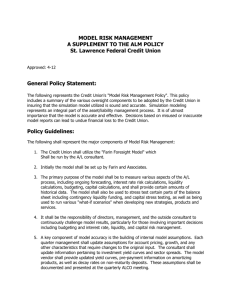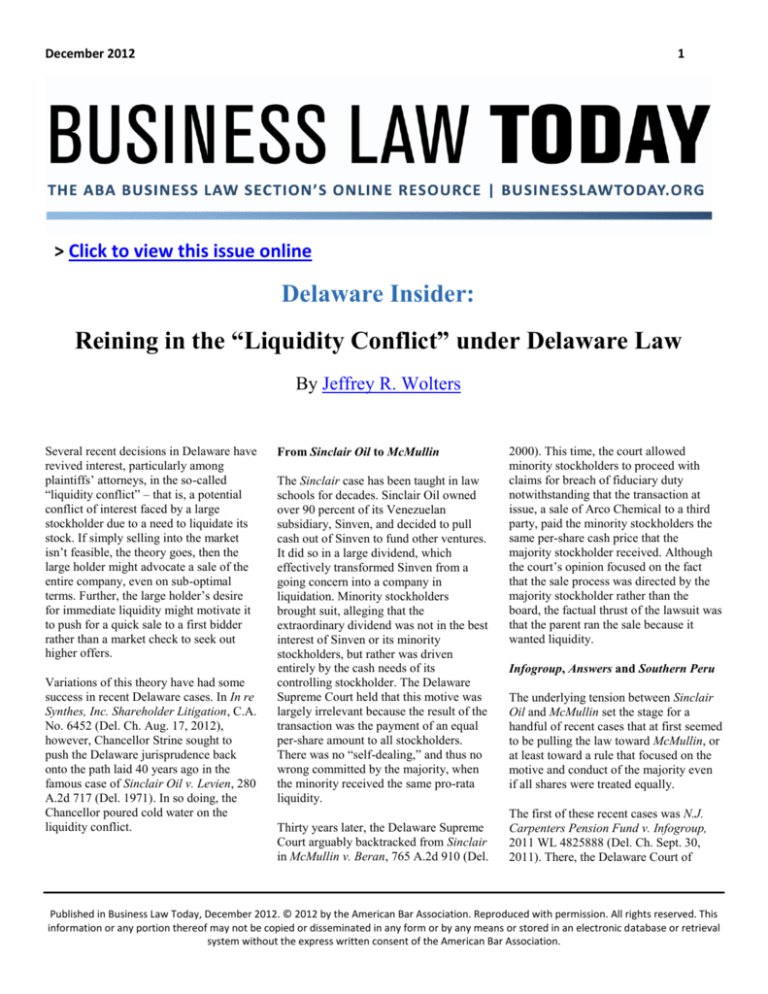
December 2012
1
> Click to view this issue online
Delaware Insider:
Reining in the “Liquidity Conflict” under Delaware Law
By Jeffrey R. Wolters
Several recent decisions in Delaware have
revived interest, particularly among
plaintiffs’ attorneys, in the so-called
“liquidity conflict” – that is, a potential
conflict of interest faced by a large
stockholder due to a need to liquidate its
stock. If simply selling into the market
isn’t feasible, the theory goes, then the
large holder might advocate a sale of the
entire company, even on sub-optimal
terms. Further, the large holder’s desire
for immediate liquidity might motivate it
to push for a quick sale to a first bidder
rather than a market check to seek out
higher offers.
Variations of this theory have had some
success in recent Delaware cases. In In re
Synthes, Inc. Shareholder Litigation, C.A.
No. 6452 (Del. Ch. Aug. 17, 2012),
however, Chancellor Strine sought to
push the Delaware jurisprudence back
onto the path laid 40 years ago in the
famous case of Sinclair Oil v. Levien, 280
A.2d 717 (Del. 1971). In so doing, the
Chancellor poured cold water on the
liquidity conflict.
From Sinclair Oil to McMullin
The Sinclair case has been taught in law
schools for decades. Sinclair Oil owned
over 90 percent of its Venezuelan
subsidiary, Sinven, and decided to pull
cash out of Sinven to fund other ventures.
It did so in a large dividend, which
effectively transformed Sinven from a
going concern into a company in
liquidation. Minority stockholders
brought suit, alleging that the
extraordinary dividend was not in the best
interest of Sinven or its minority
stockholders, but rather was driven
entirely by the cash needs of its
controlling stockholder. The Delaware
Supreme Court held that this motive was
largely irrelevant because the result of the
transaction was the payment of an equal
per-share amount to all stockholders.
There was no “self-dealing,” and thus no
wrong committed by the majority, when
the minority received the same pro-rata
liquidity.
Thirty years later, the Delaware Supreme
Court arguably backtracked from Sinclair
in McMullin v. Beran, 765 A.2d 910 (Del.
2000). This time, the court allowed
minority stockholders to proceed with
claims for breach of fiduciary duty
notwithstanding that the transaction at
issue, a sale of Arco Chemical to a third
party, paid the minority stockholders the
same per-share cash price that the
majority stockholder received. Although
the court’s opinion focused on the fact
that the sale process was directed by the
majority stockholder rather than the
board, the factual thrust of the lawsuit was
that the parent ran the sale because it
wanted liquidity.
Infogroup, Answers and Southern Peru
The underlying tension between Sinclair
Oil and McMullin set the stage for a
handful of recent cases that at first seemed
to be pulling the law toward McMullin, or
at least toward a rule that focused on the
motive and conduct of the majority even
if all shares were treated equally.
The first of these recent cases was N.J.
Carpenters Pension Fund v. Infogroup,
2011 WL 4825888 (Del. Ch. Sept. 30,
2011). There, the Delaware Court of
Published in Business Law Today, December 2012. © 2012 by the American Bar Association. Reproduced with permission. All rights reserved. This
information or any portion thereof may not be copied or disseminated in any form or by any means or stored in an electronic database or retrieval
system without the express written consent of the American Bar Association.
December 2012
Chancery declined to dismiss claims for
breach of fiduciary duty brought against a
controlling stockholder for orchestrating a
sale of the company to a third party. All
stockholders received the same per-share
cash price. However, the plaintiff alleged
that the sale was motivated by the
controller’s particular need for cash.
Indeed, it was alleged that the controller,
Gupta, was in desperate need of liquidity
to satisfy personal judgments, repay
personal loans, and start a new venture;
that he had no source of cash inflow or
liquid assets (other than his stock); and
that he had threatened his fellow directors
with lawsuits if they did not approve the
sale. Faced with allegations of such selfinterest, the court declined to dismiss the
complaint.
Similarly extreme, although less colorful,
allegations were made in In re Answers
Corp Shareholders Litigation, 2012 WL
1253072 (Del. Ch. Apr. 11, 2012). There,
a minority stockholder alleged that a
venture capital firm owned 30 percent of
Answers Corporation and decided to force
a quick sale to meet its own liquidity
needs, even though the company had
strong projections and was about to
announce a “blowout” quarter. Further, it
was alleged that the independent members
of the board had acted in bad faith (that is,
conscious disregard of their fiduciary
duties) in acceding to the sale. The Court
of Chancery ruled that in light of the
pleaded facts and Delaware’s lenient
standard for avoiding dismissal of a claim
(which requires only that it be
“reasonably conceivable” that the plaintiff
could recover), the complaint could not be
dismissed.
Finally, in In re Southern Peru Copper
Corp. Shareholder Derivative Litigation,
30 A.3d 60 (Del. Ch. 2011), aff’d __ WL
__ (Del. 2012), even Chancellor Strine
recognized a variant of the liquidity
conflict. The case, which resulted in the
largest damages award in Delaware M&A
history, involved a transaction between
Southern Peru and its majority
stockholder, Grupo Mexico. Because
Grupo stood on both sides of the
transaction, the court applied Delaware’s
2
exacting “entire fairness” test. The test
was not satisfied, primarily because the
court found that the price was unfair.
However, the court was also critical of the
process that led to the transaction,
including the fact that a director on
Southern Peru’s independent committee
that negotiated the transaction had a form
of liquidity conflict. Specifically, that
director was the designee of a large
stockholder, which wanted to sell its stake
and was negotiating (largely through its
director designee) with the majority
stockholder for registration rights to
enable the sale. Chancellor Strine noted
that while he was hesitant to regard this
interest as a classic conflict in the sense of
self-dealing, it nonetheless skewed the
director’s incentives – since he “was
operating under a constraint that was not
shared by all stockholders, which was his
employer’s desire to sell its holdings” –
and cast doubt on whether he should have
been on the committee.
The Synthes Decision: Reining in the
Liquidity Conflict
Soon after Southern Peru, Chancellor
Strine had another chance to consider the
liquidity conflict, in In re Synthes, Inc.
Shareholder Litigation. This time, the
Chancellor rejected the theory in emphatic
terms, moving the law back toward the
Sinclair rule – i.e., that equal treatment of
stockholders generally obviates any
conflict – and stating that a liquidity
conflict was likely to trigger the entire
fairness test only in extraordinary
circumstances.
The case involved the sale of Synthes,
Inc., a global medical device company
with headquarters in Switzerland, to
Johnson & Johnson. Synthes’ 76-year-old
chairman controlled over 50 percent of
Synthes’ stock and, according to
plaintiffs, wanted to divest to achieve
estate planning and tax goals. The
plaintiffs alleged that these interests
created a unique “liquidity dilemma” that
infected the sale process. Chancellor
Strine dismissed the complaint.
Strictly speaking, the dismissal was based
on the absence of well-pleaded facts
indicating that the chairman was in a rush
to sell or had instigated the sale process,
or that the sale process was hurried or
failed to check the market. More
generally, however, the Chancellor also
addressed the potency of the liquidity
conflict as a theory under Delaware law.
Here he looked to the “venerable and
sound” rule of the Sinclair case, that “pro
rata treatment remains a form of safe
harbor under our law.” He elaborated that
he foresaw only “very narrow
circumstances” where a controlling
stockholder’s need for liquidity could
create a disabling conflict of interest
irrespective of pro rata treatment, such as
(citing Infogroup) if the controller forced
a “crisis, fire sale” without a market check
to satisfy an “exigent need (such as a
margin call or default in a larger
investment).” The Chancellor added a
colorful example of his own to drive
home the point that, in his view, the
liquidity conflict was more hypothetical
than real:
The world is diverse enough that it is
conceivable that a mogul who needed
to address an urgent debt situation at
one of his coolest companies (say a
sports team or entertainment or
fashion business), would sell a
smaller, less sexy, but fully solvent
and healthy company in a finger snap
(say two months) at 75% of what
could be achieved if the company
sought out a wider variety of possible
buyers, gave them time to digest nonpublic information, and put together
financing. In that circumstance, the
controller’s personal need for
immediate cash to salvage control over
the financial tool that allows him to
hang with stud athletes, supermodels,
hip hop gods, and other pop culture
icons, would have been allowed to
drive corporate policy at the healthy,
boring company and to have it be sold
at a price less than fair market value,
subjecting the minority to unfairness.
At the same time, the Chancellor also
acknowledged, less conspicuously in a
Published in Business Law Today, December 2012. © 2012 by the American Bar Association. Reproduced with permission. All rights reserved. This
information or any portion thereof may not be copied or disseminated in any form or by any means or stored in an electronic database or retrieval
system without the express written consent of the American Bar Association.
December 2012
3
footnote, that the plaintiffs in Synthes had
not relied on McMullin. That
“controversial” case, the Chancellor
wrote, offered some support for the
liquidity conflict theory. It was inapposite
in Synthes, however, because the
alternative transaction advocated by the
plaintiffs in Synthes would not have
treated all stockholders (including the
controller) on a pro rata basis. Thus,
looking to the future, while Chancellor
Strine is clearly skeptical of the liquidity
conflict theory, the Delaware courts have
probably not seen the last of it.
Jeffrey R. Wolters is a partner in the
Corporate Counseling Group of Morris,
Nichols, Arsht & Tunnell LLP, in
Wilmington, Delaware, specializing in
providing Delaware law advice in
corporate transactions. The views in this
article are the author’s and not
necessarily those of his firm.
Published in Business Law Today, December 2012. © 2012 by the American Bar Association. Reproduced with permission. All rights reserved. This
information or any portion thereof may not be copied or disseminated in any form or by any means or stored in an electronic database or retrieval
system without the express written consent of the American Bar Association.

